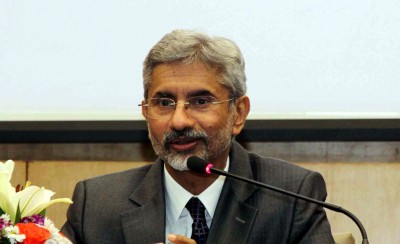
New Delhi, The coronavirus vaccine - one of the world's most in-demand commodities - has become a new currency for international diplomacy, in which India seems to be having an upper hand over its competitor China.
With an unmatched vaccine manufacturing power, India is giving away millions of doses to its neighbours, friendly and estranged alike. Recently, neighbouring countries in South Asia like Nepal and Sri Lanka have received the shots in plenty while around 40 nations have been benefited by the goodwill gesture of India.
However, India is in no mood to slow down and would be offering the doses to 34 more nations, External Affairs Minister S. Jaishankar informed IANS during an exclusive interaction. He said that around 34 countries are in the queue to receive Covid vaccines from India within a few days.
"We have provided vaccines to around 40 countries and around 34 are in the queue to receive them further. We have finalised the list of who will be obtaining the vaccines within the next few days," Jaishankar told IANS.
He said that vaccinating the world along with India's own people comes as a moral responsibility for India, adding that 'the whole world trusts' the country for this.
"Being the world's biggest vaccine manufacturer, it's natural that India will not just immunise its own population, but will extend it to the other parts of the world. The whole world trusts us on this," Jaishankar said.
When asked about the countries who would be benefiting further, he said that they are scattered across the globe. "It includes our neighbouring countries, South Asian nations, countries in the Gulf region, small islands near Australia, and South American countries. So I'll say that we are reaching out to nations across the globe," Jaishankar informed IANS.
India is also a part of the World Health Organization's (WHO) COVAX facility in which the country will share as well as receive vaccines to and from 81 other lower and middle income countries. One such dispatch was done on February 26 when around 6,00,000 doses of Covishield were shipped to Ghana from the Serum Institute of India's Pune factory, which is manufacturing it in india.
However, not many nations seem to be taking homegrown Bharat Biotech's Covaxin since it was mired in a controversy regarding its safety and yet to be known efficacy. The confidence on Covaxin is not at par with the Covishield, which is a counterpart of AstraZeneca/Oxford university developed AZD122, currently manufactured in India by the Pune-based SII.
The bone of contention is efficacy data which Bharat Biotech failed to produce during the approval of Covaxin. India's drug regulator had approved Covaxin and Covishield on January 3 under an accelerated approval scheme. While Covishield obtained Emergency Use Authorisation (EUA), Covaxin received Restricted Emergency Use (REU) approval.
However, Jaishankar said that there are countries which have shown interest in Covaxin. "Many nations have shown interest in Covaxin. We are completing the formalities and its modalities are being worked out. Soon a decision would be taken on this," he said.
Commenting further, Jaishankar said that Covishield has been able to find more appeal because it was developed and manufactured way before Covaxin. So it's natural that nations will ask for the vaccines which are more in production. I don't see any factor of trust deficit here. I'm sure Covaxin will catch-up with time," he said.
The minister also said that apart from the two vaccines, India will be having a huge portfolio of different kinds of vaccines. "I'm told that we have as many as 30 vaccines under development. Of them, five or may be seven might get approval as well. So we are so far so good," he added.
On Monday, Jaishankar himself received the first vaccine shot at the AIIMS here. When asked how he was feeling after the shot, the minister said: "Perfectly fine and confident."


.jpeg)

